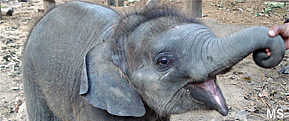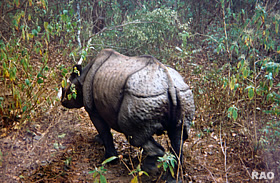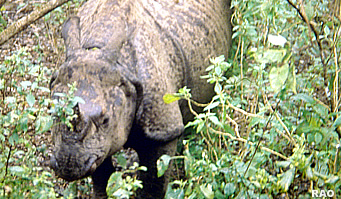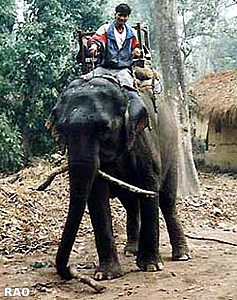 |
|
|
| Chitwan National Park |
|
|
|
|
 |
| National Parks Map |
|
|
Chitwan Information | Chitwan Tour |
 |
| Villagers involved in rhino poaching |
Chitwan
National Park officials have expressed serious concern over the increased
involvement of local villagers in poaching rhinoceros and smuggling their
hides and parts for immediate gains. "This year, among the two dozen persons
who were arrested on charges of poaching rhinos 22 poachers were from Chitwan
district alone", an acting conservation officer said.
| Elephants with TB face apathy |
Ten elephants of Chitwan National Park (CNP), suffering from tuberculosis (TB) for the last 18 months are not getting treatment due to apathy of concerned authorities. The infected elephants have been moved to several posts across the Narayani river in Nawalparasi district.
Calf
names
In
the past elephant calves were named after royalties with approval from
the royal palace. In the futere the nwe born claves will get names of personalities
in the field of nature conservation. The Department of National Parks and
Wildlife Conservation approved the names of 13 calves. The names include
Loktantra Kali, Chitrasen Kali, Sarswoti Kali, Narayani Kali, Tirthaman
Prasad, Bikram Prasad, Tamurkali, Lavaprasad, Siddha Prasad, Sher Prasad,
Kush Prasad and Krishna Prasad.
| US Ambassador urges action to protect endangered rhinos |
SAURAHA, CHITWAN - U.S. Ambassador James F. Moriarty called for Nepal and the international community to join together to protect the country's endangered rhinoceros population.
In a statement read in Nepali to reporters this evening, the Ambassador said "more must be done" to protect the rhinos, whose numbers have declined dramatically in recent years because of criminal poaching. (The full statement is provided below.)
The Ambassador is visiting Chitwan today and tomorrow morning to explore the issue of rhino poaching and meet with officials and environmentalists. During his stay, he will be briefed on the Terai Landscape Arc (TAL) Project, which seeks to create a single landscape of 49,500 square kilometers by connecting 11 protected areas in Nepal and India. Restoring the TAL will help ensure the survival of key endangered species, including the rhino.
The project is supported by USAID, the U.S. government's humanitarian assistance and development agency, and the World Wildlife Fund (WWF) Nepal Program.
Ambassador Moriarty also visited the Biodiversity Conservation Center at Chitwan National Park and was briefed on its activities.
 |
|
Ambassador Moriarty also visited the Biodiversity Conservation Center at Chitwan National Park and was briefed on its activities
Here is the text of his remarks
Statement by U.S. Ambassador James F. Moriarty To Reporters in Sauraha, Chitwan
February 14, 2007
I have come to Chitwan to examine the serious issue of rhinoceros poaching. This criminal activity is the primary cause for the alarming decline of rhinoceros in Nepal.
In the last five years alone, 106 rhinos were poached from Chitwan National Park and surrounding areas. Nepal and the international community must work together to protect these rhinos from poaching, and help ensure their survival.
I understand the NGO community, which has a history of providing generous assistance to save the rhinos, has stepped in with short-term support to assist Nepal's anti-poaching operations. The Government has also re-established security posts and increased patrols within the park. This is welcome, but more must be done. I have raised this issue with my own Government and we will be looking for ways to support Nepal in protecting its rhino population.
Future generations of Nepalis - and large numbers of environmental tourists - will thank Nepal and its international partners if we join together now to effectively protect and nurture these magnificent creatures.
Thank you.

|
| Rare rhinos disappearing in Nepal |
2006 could've been a better year for the Greater One-horned Rhino. The high global demand for rhinos percolated down right to the forests of Nepal where illegal wildlife trade networks encouraged poachers to take bolder risks.
While the decade long conflict in Nepal did take a toll on the protection of endangered species like the rhino, the return of peace to the country has not seen a marked drop in poaching. This highlights the fact that the illegal wildlife trade has an entrenched network in the country. In the past 12 months, 19 rhinos were poached in Chitwan alone. In May, WWF raised the alarm on a drastic decrease in rhino populations and possibly tiger numbers too, indicating widespread poaching in the Babai Valley.
 |
|
The alarming rise has led to a multi-pronged effort to stop rhino poaching in Chitwan. Enforcement authorities along with vital support from local communities have begun to make every effort to control of poaching in Chitwan. In August, local people, politicians and the Maoists banded together for the important Rhino Declaration 2063, which contained important recommendations and directives to save the rhino. The unprecedented release of nine rhino poachers by the Government of Nepal in September was strongly protested by WWF Nepal together with our conservation partners IUCN Nepal and AsRSG. In November, the Eco Club Network in Chitwan collected over 1,00,000 signatures to raise awareness for anti-poaching. This was handed over to Honourable State Minister of Forests and Soil Conservation Mr Dilendra Prasad Baru in December.
WWF Nepal has been a strong supporter of rhino conservation. At this critical juncture we have funded anti-poaching operations both inside and out of national parks. We continue to work closely with communities and youth groups to raise awareness and gather information against poachers. With the Government of Nepal in the lead, we advocate for better implementation of laws on poaching and illegal wildlife trade.
2006 may not have been the best year for the rhinos in Nepal but the New Year, 2007, gives us new opportunities to secure a future for this magnificent creature.
Please help us save the Greater One-horned Rhinoceros!
| Source: WWF-
the environmental conservation organisation © [Rare rhinos disappearing in Nepal, 28 Dez2006] WWF - the environmental conservation organisation . Some rights reserved.x |
 |
| near Chitwan National Park |
| Elephant Race in Chitwan |
The 3rd annual International Elephant race was organized in the tourist village of Sauraha from 26 - 28 December 2006. This year's event saw 24 elephants take part in different events under the banners of national and international teams. The race was won by 'Janga Bahadur Gaja' a male elephant driven by 24 year old Phanit Nasir Ali. Janga Bahadur completed the 600 metres race in a record time of 1 min 37.33 sec. beating the first runner up 'Pawan Kali'(1 min 37.97 seconds) by a very small margin.
 |
|
Trained elephants have a long standing history of saving one horned rhinos, Bengal tigers and Gharial crocodiles in Chitwan National Park. The events also aim to promote elephant based Safari and cultural tourism in Chitwan and provide insurance coverage to elephant drivers (mahouts), and provide welfare services. Through the events, the organizers also aim at highlighting much needed research on ecology, infertility, food and water supply and genetic/biological problems among animal lovers, ecologists, scientific communities and the public at large.
Although the venue and the events were overwhelmed by elephant participation, the focus intermittently shifted towards the rhinos in the adjacent jungles, who have been struggling to survive a burst of poaching activities in the past few months. The events also featured cultural and musical programs which addressed and urged the local people about the plight of the one horned rhino in Chitwan.
| Source: WWF-
the environmental conservation organisation © [Elephant Race in Chitwan, 02 Jan 2007] WWF - the environmental conservation organisation . Some rights reserved. |

|
|
|
|